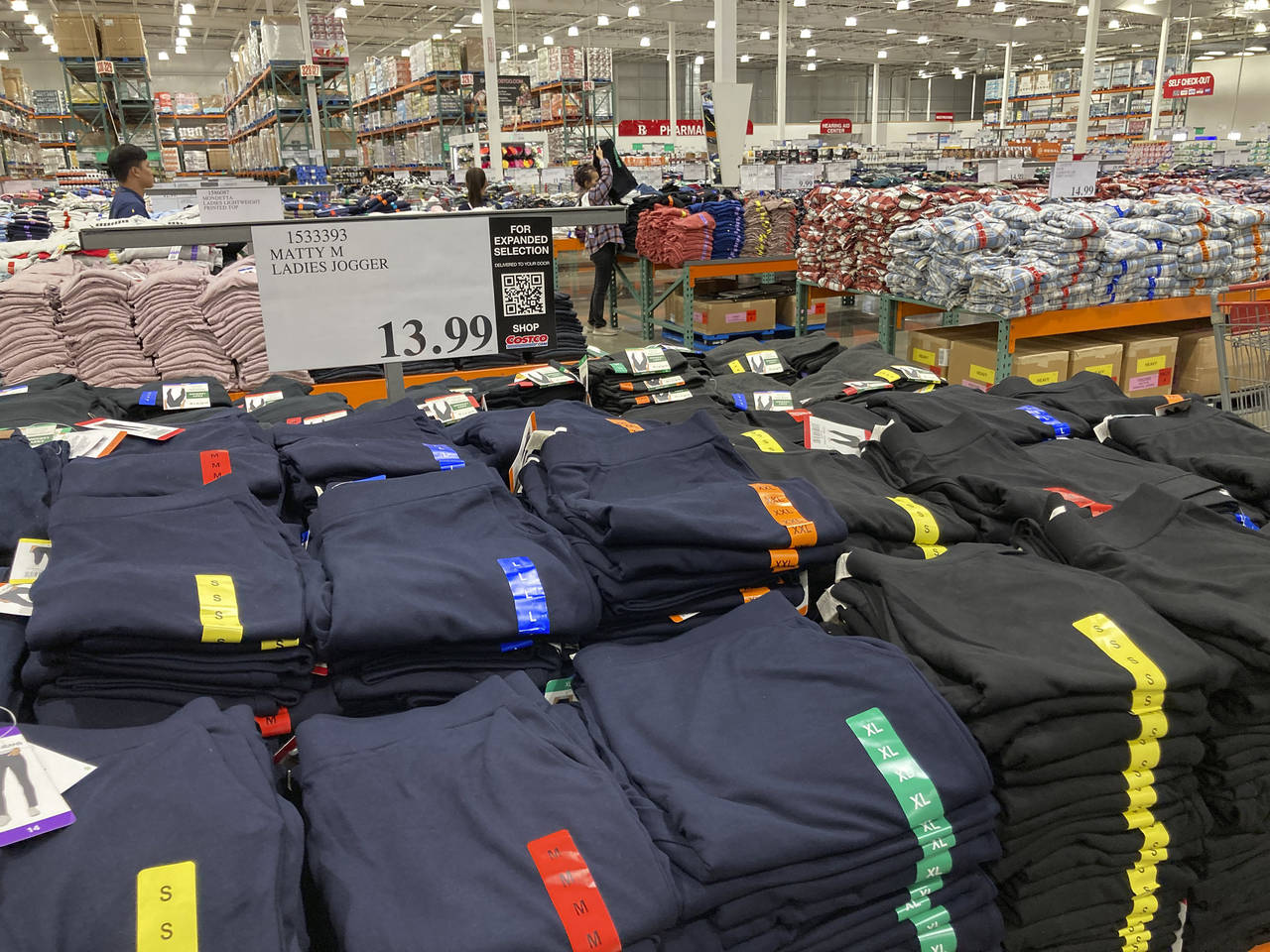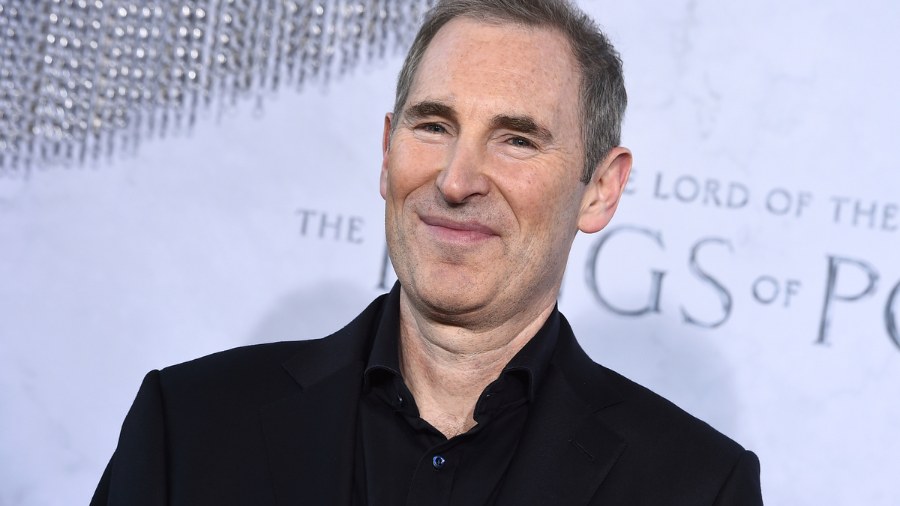How steep Fed rate hikes affect your finances
Sep 20, 2022, 9:01 AM | Updated: Sep 21, 2022, 11:47 am

FILE - Clothing sits on tables for shoppers in a Costco warehouse Monday, Aug. 29, 2022, in Sheridan, Colo. The Federal Reserve is expected to raise its key short-term rate by a substantial three-quarters of a point for the third consecutive time Wednesday, Sept. 21. The goal is to slow consumer spending, reducing demand for homes, cars and other goods and services, eventually cooling the economy and lowering prices. (AP Photo/David Zalubowski)
(AP Photo/David Zalubowski)
NEW YORK (AP) — Mortgage rates have jumped, home sales have slumped and credit cards and auto loans have gotten pricier. Savings rates are slightly juicier, though.
As the Federal Reserve has rapidly increased interest rates, many economists say they fear that a recession is inevitable in the coming months — and with it, job losses that could cause hardship for households already hurt worst by inflation.
Wednesday, the Federal Reserve sharply raised its key short-term rate by three-quarters of a point for a third straight time, even as its previous rate increases are being felt by households at all income levels.
The Fed’s latest move has raised its benchmark rate to a range of 3% to 3.25%, the highest level in 14 years. Its steady rate increases have already made it increasingly costly for consumers and businesses to borrow — for homes, autos and other purchases. And more hikes are almost surely coming. Fed officials are expected to signal Wednesday that their benchmark rate could reach as high as 4.5% by early next year.
Here’s what to know:
HOW DOES RAISING INTEREST RATES REDUCE INFLATION?
If one definition of inflation is ” too much money chasing too few goods,” then by making it more expensive to borrow money, the Fed hopes to reduce the amount of money in circulation, eventually lowering prices.
WHICH CONSUMERS ARE MOST AFFECTED?
Anyone borrowing money to make a large purchase, such as a home, car, or large appliance, will take a hit, said Scott Hoyt, an analyst with Moody’s Analytics.
“The new rate pretty dramatically increases your monthly payments and your cost,” he said. “It also affects consumers who have a lot of credit card debt — that will hit right away.”
That said, Hoyt noted that household debt payments, as a proportion of income, remain relatively low, though they have risen lately. So even as borrowing rates steadily rise, many households might not feel a much heavier debt burden immediately.
“I’m not sure interest rates are top of mind for most consumers right now,” Hoyt said. “They seem more worried about groceries and what’s going on at the gas pump. Rates can be something tricky for consumers to wrap their minds around.”
HOW WILL THIS AFFECT CREDIT CARD RATES?
Even before the Fed’s decision Wednesday, credit card borrowing rates have reached their highest level since 1996, according to Bankrate.com, and these will likely continue to rise.
And with inflation raging, there are signs that Americans are increasingly relying on credit cards to help maintain their spending. Total credit card balances have topped $900 billion, according to the Federal Reserve, a record high, though that amount isn’t adjusted for inflation.
John Leer, chief economist at Morning Consult, a survey research firm, said its polling suggests that more Americans are spending down the savings they accumulated during the pandemic and are using credit instead. Eventually, rising rates could make it harder for those households to pay off their debts.
Those who don’t qualify for low-rate credit cards because of weak credit scores are already paying significantly higher interest on their balances, and they’ll continue to.
As rates have risen, zero percent loans marketed as “Buy Now, Pay Later” have also become popular with consumers. Yet longer-term loans of more than four payments that these companies offer are subject to the same increased borrowing rates as credit cards.
For people who have home equity lines of credit or other variable-interest debt, rates will increase by roughly the same amount as the Fed hike, usually within one or two billing cycles. That’s because those rates are based in part on banks’ prime rate, which follows the Fed’s.
WHAT IF I WANT TO BUY A CAR?
Auto loans are at their highest levels since 2012, according to Bankrate.com’s Greg McBride. Rates on new auto loans are likely to go up by nearly as much as the Fed’s rate increase. That could knock some lower-income buyers out of the new-vehicle market, said Jessica Caldwell, executive director at Edmunds.com.
Caldwell added that the entire increase isn’t passed on to consumers; some automakers are subsidizing rates to attract buyers. Bankrate.com says a 60-month new vehicle loan averaged just over 5% last week, up from 3.86% in January. A 48-month used vehicle loan was 5.6%, up from 4.4% in January.
Many lower-income buyers have already been priced out of the new-vehicle market, according to Caldwell. Automakers have been able to get top dollar for their vehicles because demand is high and supply is low. For more than a year, the industry has been grappling with a shortage of computer chips that has slowed factories worldwide.
HOW ARE SAVERS AFFECTED?
The rising returns on high-yield savings accounts and certificates of deposit (CDs) have put them at levels not seen since 2009, which means households may want to boost savings wherever possible. You can also now earn more on bonds and other fixed-income investments.
Though savings, CDs, and money market accounts don’t typically track the Fed’s changes, online banks and others that offer high-yield savings accounts can be exceptions. These institutions typically compete aggressively for depositors. (The catch: They sometimes require significantly high deposits.)
In general, banks tend to capitalize on a higher-rate environment to boost their profits by imposing higher rates on borrowers, without necessarily offering juicer rates to savers.
WILL THIS AFFECT RENTS? HOME OWNERSHIP?
Last week, the average fixed mortgage rate topped 6%, its highest point in 14 years, meaning that rates on home loans are about twice as expensive as they were a year ago.
Mortgage rates don’t always move perfectly in tandem with the Fed increase, instead tracking the expected yield on the 10-year Treasury note. The yield on the 10-year Treasury note has reached nearly 3.6%, its highest level since 2011.
Asking rents are up 11% from last year, said Daryl Fairweather, an economist with the brokerage Redfin. But price growth has slowed, and some renters are moving to more affordable areas.
WILL IT BE EASIER TO FIND A HOUSE IF I’M STILL LOOKING TO BUY?
If you’re financially able to proceed with a home purchase, you’re likely to have more options than at any time in the past year. Sales of both new and existing homes have dropped steadily for months.
HOW HAVE THE RATE HIKES INFLUENCED CRYPTO?
Cryptocurrencies like bitcoin have dropped in value since the Fed began raising rates. So have many previously high-valued technology stocks. Bitcoin has plunged from a peak of about $68,000 to under $20,000.
Higher rates mean that safe assets like Treasuries have become more attractive to investors because their yields have increased. That makes risky assets like technology stocks and cryptocurrencies less attractive, in turn.
Still, bitcoin continues to suffer from problems separate from economic policy. Two major crypto firms have failed, shaking the confidence of crypto investors.
WHAT’S PROMPTING THE RATE INCREASES?
The short answer: Inflation. Over the past year, inflation has clocked in at a painful 8.3%. So-called core prices, which exclude food and energy, also rose faster than expected.
Fed Chair Jerome Powell warned last month that, “our responsibility to deliver price stability is unconditional” — a remark widely interpreted to mean the Fed will fight inflation with rate increases even if it leads to deep job losses or a recession.
The goal is to slow consumer spending, thereby reducing demand for homes, cars and other goods and services, eventually cooling the economy and lowering prices.
Powell acknowledged that aggressively raising interest rates would “bring some pain.”
WHAT ABOUT MY JOB?
Some economists argue that widespread layoffs will be necessary to slow rising prices. One argument is that a tight labor market is fueling wage growth and higher inflation. In August, the economy gained 315,000 jobs. There are roughly two job openings advertised for every unemployed worker.
“Job openings continue to exceed job hires, indicating employers are still struggling to fill vacancies,” noted Odeta Kushi, an economist with First American.
As a result, some argue higher unemployment might cool wage pressures and tame inflation. Research published earlier this month by the Brookings Institution stated that unemployment might have to go as high as 7.5% to reduce inflation to the Fed’s 2% target.
WILL THIS AFFECT STUDENT LOANS?
Borrowers who take out new private student loans should prepare to pay more as as rates increase. The current range for federal loans is between about 5% and 7.5%.
That said, payments on federal student loans are suspended with zero interest until Dec. 31 as part of an emergency measure put in place early in the pandemic. President Joe Biden has also announced some loan forgiveness, of up to $10,000 for most borrowers, and up to $20,000 for Pell Grant recipients.
IS THERE A CHANCE THE RATE HIKES WILL BE REVERSED?
Stock prices rose in August based on hopes that the Fed would reverse course. But it looks increasingly unlikely that rates will come down anytime soon. Economists expect Fed officials to forecast that the key rate could reach 4% by the end of this year. They’re also likely to signal additional increases in 2023, even to 4.5%.
WILL THERE BE A RECESSION?
Short-term rates at these levels will make a recession likelier by increasing the cost of mortgages, car loans, and business loans. While the Fed hopes that higher borrowing costs will slow growth by cooling the hot job market and capping wage growth, the risk is that the Fed could weaken the economy, causing a recession that would produce significant job losses.
___
AP Business Writers Christopher Rugaber in Washington, Tom Krisher in Detroit and Damian Troise and Ken Sweet in New York contributed to this report.
___
The Associated Press receives support from Charles Schwab Foundation for educational and explanatory reporting to improve financial literacy. The independent foundation is separate from Charles Schwab and Co. Inc. The AP is solely responsible for its journalism.”
Copyright © The Associated Press. All rights reserved. This material may not be published, broadcast, rewritten or redistributed.












